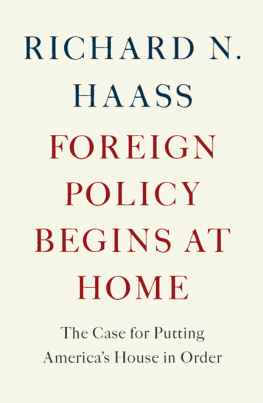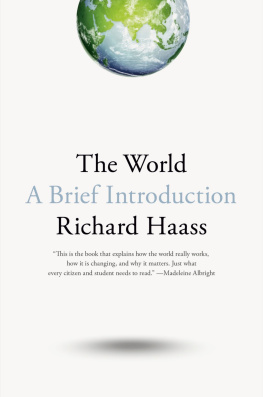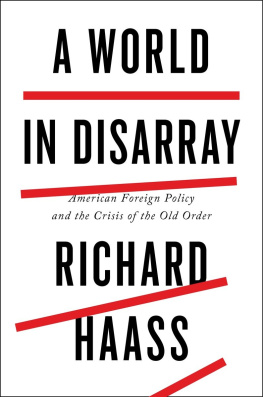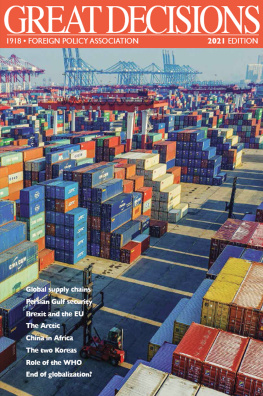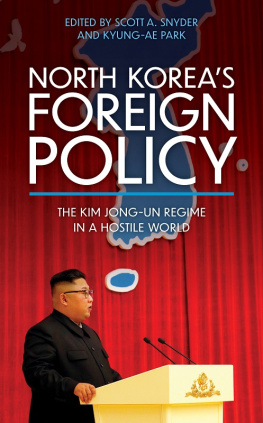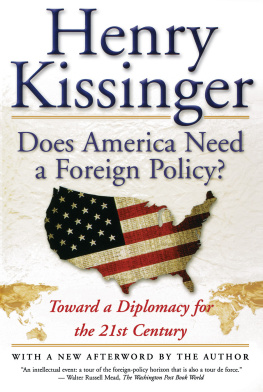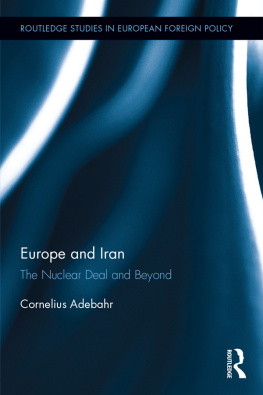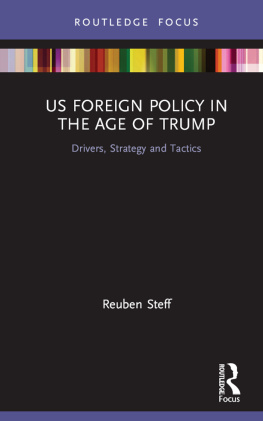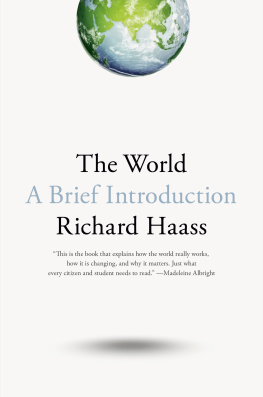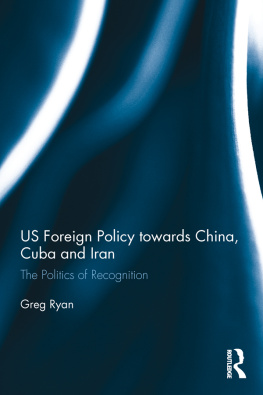FOREIGN POLICY
BEGINS AT HOME
ALSO BY RICHARD N. HAASS
War of Necessity, War of Choice
The Opportunity
The Reluctant Sheriff
The Bureaucratic Entrepreneur
Intervention
Conflicts Unending
Beyond the INF Treaty
Congressional Power
EDITED VOLUMES
Honey and Vinegar
Transatlantic Tensions
Economic Sanctions and American Diplomacy
Superpower Arms Control
FOREIGN POLICY
BEGINS AT HOME


The Case for Putting Americas House in Order
Richard N. Haass
BASIC BOOKS
A MEMBER OF THE PERSEUS BOOKS GROUP
New York
Copyright 2013 by Richard N. Haass
Published by Basic Books,
A Member of the Perseus Books Group
All rights reserved. Printed in the United States of America. No part of this book may be reproduced in any manner whatsoever without written permission except in the case of brief quotations embodied in critical articles and reviews. For information, address Basic Books, 250 West 57th Street, New York, NY 10107.
Books published by Basic Books are available at special discounts for bulk purchases in the United States by corporations, institutions, and other organizations. For more information, please contact the Special Markets Department at the Perseus Books Group, 2300 Chestnut Street, Suite 200, Philadelphia, PA 19103, or call (800) 810-4145, ext. 5000, or e-mail .
Library of Congress Cataloging-in-Publication Data
Haass, Richard.
Foreign policy begins at home : the case for putting Americas house in order / Richard Haass.
pages; cm
Includes bibliographical references and index.
ISBN 978-0-4650-6596-7 (e-book) 1. United StatesForeign relations. 2. United StatesPolitics and government. 3. World politics. 4. International relations. 5. Security, International. I. Title.
JZ1480.H32 2013
327.73dc23
2012049203
10 9 8 7 6 5 4 3 2 1
Dedicated to Brent Scowcroft
CONTENTS
This relatively short book is predicated on a consequential idea: The biggest threat to Americas security and prosperity comes not from abroad but from within. The United States has jeopardized its ability to act effectively in the world because of runaway domestic spending, underinvestment in human and physical capital, an avoidable financial crisis, an unnecessarily slow recovery, a war in Iraq that was flawed from the outset and a war in Afghanistan that became flawed as its purpose evolved, recurring fiscal deficits, and deep political divisions. For the United States to continue to act successfully abroad, it must restore the domestic foundations of its power. Foreign policy needs to begin at home, now and for the foreseeable future.
Foreign Policy Begins at Home is a book that I never imagined writing. Sandpaper off the nuances and subtleties, and this is a book that argues for less foreign policy of the sort the United States has been conducting and greater emphasis on domestic investment and policy reform. For someone such as me, a card-carrying member of the foreign policy establishment for nearly four decades, this borders on heresy.
What got me to this point? More than anything else it began with the second Iraq war (begun in 2003) and the Afghan troop surge initiated in 2009. I mention both because my differences over the trajectory of American foreign policy are not with a single party. Many participants in the foreign policy debate in both parties appear to have forgotten the injunction of former president and secretary of state John Quincy Adams (that America goes not abroad in search of monsters to destroy), along with the lessons of Vietnam about the limits of military force and the tendency of local realities to prevail over global abstractions. As was the case with Vietnam, neither Iraq nor Afghanistan (as of 2009) was a war of necessity; more important, neither was a justifiable war of choice. In both cases, the interests at stake were decidedly less than vital. In both cases, alternative policies were available that promised outcomes of comparable benefit to this country at far less cost. And in both cases, history and even a cursory study of the societies in question suggested that ambitious attempts to refashion the workings and political cultures of these countries would founder. What is more, all this was predictable at the time. Now, with the advantage of hindsight, we can see that more than a decade of enormous sacrifice has hurt this countrys reputation for judgment and competence and failed to produce results in any way commensurate with the human, military, and economic costs of the undertakings. Such an imbalance between means and ends makes no strategic sense at the best of times; it is even less defensible now, when the United States faces difficult challenges to its solvency.
This book grows naturally out of two previous books of mine. The Reluctant Sheriff, published in 1997 in the early years of the post-Soviet, postCold War era, argued the United States, at a time when it enjoyed extraordinary advantages and possibilities to influence other governments, risked squandering a unique chance to bring about lasting change in the world by aiming too low and trying too little in the way of erecting new international institutions able to contend with emerging global challenges. The second, published in 2005 and called The Opportunity, made the case that the United States was trying to do too much of the wrong thing (most notably, the 2003 Iraq war) and again argued for greater efforts to establish enduring international arrangements that would help tame globalization and curb the all-too-real economic and security threats to American interests and global order.
Where this book differs most from my previous books is in its focus on domestic policy, for remaking ourselves more than the world. There are, of course, external challenges, including but hardly limited to a rising China, a militarized North Korea, an Iran possibly moving to acquire nuclear weapons, an unstable Pakistan, violent terrorists, and a warming planet. These are real and justified concerns that warrant serious responses. But what makes the situation particularly worrisome are a large number of internal developments, including a burgeoning deficit and debt, crumbling infrastructure, second-class schools, an outdated immigration system, and the prospect for a prolonged period of low economic growth. Many of the foundations of this countrys power are eroding; the effect, however, is not limited to a deteriorating transportation system or jobs that go unfilled or overseas owing to a lack of qualified American workers. To the contrary, shortcomings here at home directly threaten Americas ability to project power and exert influence overseas, to compete in the global marketplace, to generate the resources needed to promote the full range of US interests abroad, and to set a compelling example that will influence the thinking and behavior of others. As a result, the ability of the United States to act and lead in the world is diminishing. I would prefer not to test the notion that this country requires a full-fledged crisis, be it in the form of a run on the dollar or some catastrophe brought about by terrorists or nature, to get its government to do what needs doing, in part because if it does, it will be that much more painful and expensive to address the shortcomings of Americas economy, schools, immigration policy, infrastructure, and much more.

